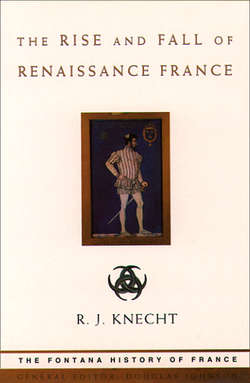Читать книгу The Rise and Fall of Renaissance France - R. Knecht J. - Страница 43
The enquiry commissions of 1523–4 and fiscal reform
ОглавлениеBy 1523 there was not enough money in the king’s coffers to pay for the war. Francis had to look for new sources of income. He suspected that he was being cheated by his own fiscal officials, and set up a commission to audit their accounts and to punish any malpractices. Not even Semblançay, who had done so much to assist the king out of his difficulties, was spared, yet his only fault had been not to distinguish between the king’s purse and his mother’s. At the end, the commissioners found that he owed Louise 707,267 livres, but that he was owed 1,190,374 livres by the king.
Francis and his ministers also began reforming the fiscal administration. The revenues most susceptible to corruption were the irregular ones, which were collected and handled in an ad hoc way by many officials. A measure of centralization was needed to ensure that they were properly collected, used and accounted for. The first step taken in this direction was the creation on 18 March of the Trésorier de l’Epargne with powers to collect and disburse all royal revenues save those from the demesne and from regular taxation. Alone among the fiscal officials, he was exempt from supervision by the trésoriers de France and généraux des finances. He took his oath of office to the king alone. The first man appointed to the post was Philibert Babou. In December his powers were considerably enlarged. He was now to receive all royal revenues after deduction of customary local expenses and authorized to make disbursements sanctioned only by royal warrants. This, however, was too heavy a burden. In June 1524, Babou was made responsible only for revenues from the demesne and taxation, while another official, called Receveur des parties casuelles, was put in charge of the rest.
In July 1524 an edict claimed that the new fiscal system had proved a success. The king had apparently been spared the need to cut back wages and pensions and had cleared many debts. Although part of his revenues continued to be spent locally, the fact that all payments now had to be authorized by a single official instead of a dozen meant that the king had a tighter control of expenditure. He was also better able to know how much cash he disposed of for emergencies. Another effect of the reforms was the destruction of the influence of the trésoriers de France and généraux des finances. Their offices survived, but their powers were drastically reduced: they continued to carry out inspections in their respective districts, but policy-making was left firmly in the hands of the king and his council.
